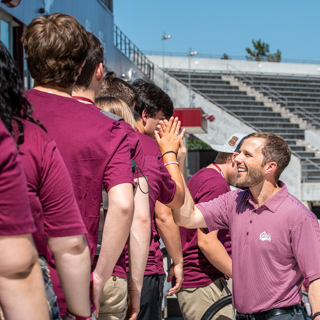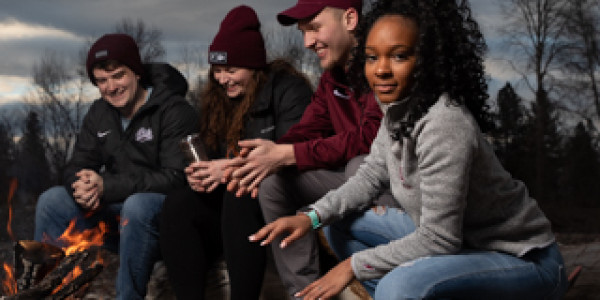Design Principles
A design principle will guide choices about how to carry out and evaluate UM’s Mission and Vision, and carry forward our fields of study, research, units and programs. Our set of design principles facilitate the development of strategic initiatives to be implemented as UM moves forward. Our set of design principles should permeate across UM and be relatively universal across units and program. When used to guide decisions, these principles will help everyone in UM’s community (from administration to faculty to staff to students) move in the same direction.
1. Impact
The University of Montana will deepen and expand its impact in Missoula, Montana, the region and the world by serving as a platform for lifelong learning that promotes civic and community engagement and experientially connects the classroom with the workplace.
- We will establish learning goals and identify accessible, flexible learning pathways that provide learners with the opportunity to be successful on their terms.
- We will utilize frameworks and tools such as competency models, industry-recognized credentials and digital portfolios that better equip learners to identify, prioritize and communicate their learning outcomes.
- We will incorporate experiential learning (clinical, internship, work-based) into our programs.
- We will evaluate the broader impact our research has on furthering discovery and knowledge creation in addressing our focal challenges and opportunities.
- We will work with the wider community, government, nonprofits and businesses to understand and track the impact our students, graduates, faculty, researc, and programs have on their ability to achieve their goals.
- We will drive understanding and exploration of complex, systemic challenges.
2. Interdisciplinary
We recognize that very often, the most important problems to address sit at the intersection of traditional disciplines and delivering impact as a university requires robust interdisciplinary collaboration and the inclusion of diverse perspectives. Our foundational knowledge and research in the humanities and sciences in combination with our professional disciplines provide powerful opportunities to deepen our understanding and appreciation of as well as our impact on the world around us.
- Undergraduate students will be equipped with tools and methodologies from multiple academic disciplines to address complex, multifaceted challenges in integrative ways.
- Students will have the opportunity to pursue extended research with faculty in their chosen field, while appreciating the broader context and connectedness of their field to others.
- Faculty will equally be encouraged to pursue research and teaching that deepens our understanding within a foundational discipline and explores the intersection of their primary expertise with other disciplines.
- Staff will be encouraged to communicate and collaborate within and across disciplines to support faculty interdisciplinary work, reinforce student learning, promote personal and professional development of all employees, and advance initiatives which dismantle silos across campus and benefit the health of the institution.
- Community members and organizations will be encouraged to engage with our students, faculty and staff in exploring the multidisciplinary and interdisciplinary challenges they face and co-creating opportunities in their areas of activity.
3. Inclusivity
Ensure all aspects of UM’s learning, research and operations facilitate and encourage full and equal participation from individuals and groups regardless of background and benefits from diverse experiences and perspectives to catalyze social mobility and civic engagement.
- We will enhance networks and pathways through which students can access experiential and workplace opportunities.
- We will seek out and remove the systemic barriers in our organizational processes, procedures and culture that may exclude or hinder the progress of individuals due to race, class, gender or disability.
- We will ensure our curriculum is representative of diverse backgrounds and perspectives and includes education on the historical origins and current reality of systemic racism and gender discrimination.
- We will pursue research that seeks to impact the wider world by removing impediments to inclusivity, such as systemic racism and gender discrimination that exist outside of the University’s direct purview.
- We will promote training and development opportunities to all employees to increase awareness of issues related to inclusivity, including as examples, differing abilities, systemic racism and gender discrimination.
- We will pursue community and civic engagement that removes barriers to inclusivity.
- We recognize that learners come from diverse backgrounds, seek lifelong learning and have unique learning goals and perspectives. We will develop programming that ensures equitable access to learning.
- We recognize that an inclusive learning environment can only be achieved through ensuring inclusive and diverse faculty and staff.
- The lens of inclusivity and diversity can enhance our ability to foster whole-person learning.
4. Inquiry
We will foster a culture of research driven by curiosity and creativity in all our work that creates new knowledge and new ways of learning. We will engage in identifying, measuring and improving the impact of our work.
- We will continue to thrive as a nucleus for research and artistic creation in the region by advancing from a Carnegie High Research to a Carnegie Research 1 institution, expanding our capacity to improve our human and environmental systems, attract world-class scholars and artists to Montana, provide undergraduate students with experiential learning opportunities, and promote a mutually beneficial relationship between research and teaching.
- We will grow our research and creative enterprise, respond to identified needs, communicate widely the benefits of that research and creative activity, and engage faculty and programs to encourage innovation.
- Students will engage in learning activities and opportunities that spark or deepen their curiosity and creativity, provide the tools for inquiry and research, connect classroom and workplace learning, and help them evaluate the potential impact of their findings with different audiences.
- Students will be encouraged to engage in inquiry consistent with the objective of lifelong, whole-person learning.
- Students will engage in extended research with faculty that may go deep or broad (or both). Students may immerse themselves in their chosen field, while appreciating the broader context and connectedness of their field to others; or, students may choose to explore topics and themes that lie at the intersection of multiple disciplines.
- Faculty will engage students in research, and where appropriate, explore interdisciplinary paths or inclusive perspectives.
- All employees will be encouraged to share and engage in their professional development and training opportunities that explore interdisciplinary paths and inclusive perspectives, and that fulfill individuals’ lifelong learning goals.
- Community members will be encouraged to engage students, faculty and staff in inquiry and research related to the challenges and opportunities they are encountering civic and workplace settings.
5. Innovation
Innovation hinges on our ability to make connections and navigate ambiguity by deploying 21st century skills meaningfully and with impact.
- We see immense value in enduring skills developed by combining deep humanistic and creative traditions with interdisciplinary innovation and entrepreneurship.[1]
- We will develop new curricular models and pilot programs in these sectors to represent a growing and networked fabric that connects a forward-facing UM community.
- We will foster accessible and flexible programs of study in which students can study and engage with large-scale challenges.
- We recognize that innovation is inherently interdisciplinary and integrative; it is forged in inquiry, and collaboration.
- We will encourage entrepreneurial and design-based collaborations that engage the region’s private and nonprofit sectors to build a stronger Montana.
- We will foster a culture of innovation that seeks to identify and evaluate opportunities to increase our impact, expand interdisciplinary collaborations, ensure inclusion and further paths of inquiry.
- We will work to equip students, faculty and staff with the capability to successfully navigate and respond to the disruptive impacts of technological developments (such as robotics and AI) on work, government, culture and society.
[1] Joseph E. Aoun, Robot-Proof: Higher Education in the Age of Artificial Intelligence (The MIT Press): Aoun, Joseph E.: 9780262535977: Amazon.Com: Books (Cambridge: The MIT Press, 2018); Dilly Fung, A Connected Curriculum for Higher Education (London: UCL Press, 2017), https://doi.org/10.14324/111.9781911576358; Christian Madsbjerg, Sensemaking: The Power of the Humanities in the Age of the Algorithm (New York: Hachette Books, 2017); David J. Staley, Alternative Universities: Speculative Design for Innovation in Higher Education (Johns Hopkins University Press, 2019), https://muse.jhu.edu/book/66169.
6. Internationalization
We recognize our place in the world and how an international lens can foster a more global and inclusive understanding of humanity and can help address some of the world’s most challenging problems.
- We will incorporate global perspectives that explore opportunities for international engagement, experiences and collaboration.
- We will drive efforts and awareness, understanding and exploration of complex, systemic challenges that face the world.
- We will cultivate the ability in all areas of University activity to recognize and respectfully engage with individuals and communities from different cultures and backgrounds.

